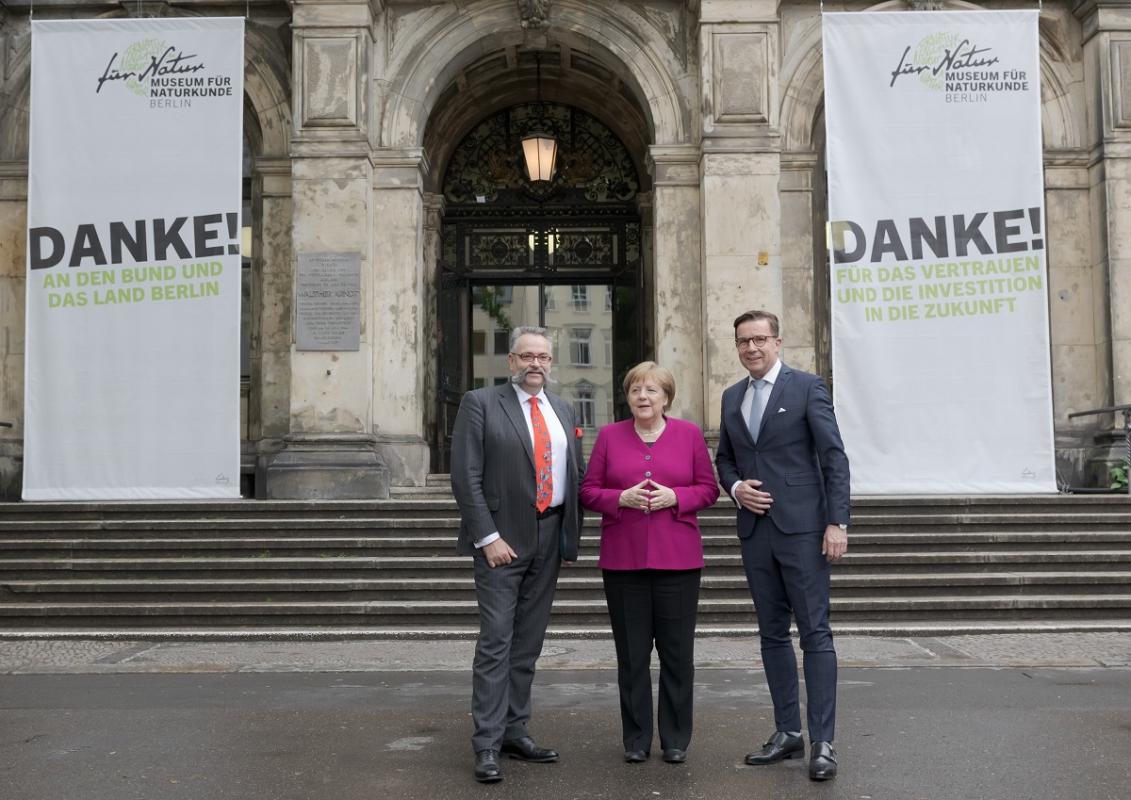Today Federal Chancellor Dr. Angela Merkel visited today the exhibitions and collection of the Museum für Naturkunde Berlin, Leibniz Institute for Evolutionary and Biodiversity Research, together with schoolchildren. Under the theme "Man and Nature - How Do We Want to Live in the Future?" Merkel learned about the research work, the relevance of the collection, the structured educational programmes and the future plan of the Research Museum. The Chancellor then spoke with schoolchildren about biological diversity and climate change.
The Chancellor was warmly welcomed by Johannes Vogel, Director General of the Museum für Naturkunde Berlin, Stephan Junker, Managing Director, and the pupils. During the subsequent guided tour together with the pupils, Merkel informed herself about the research work on the Tyrannosaurus rex Tristan Otto and on giraffes using cutting - edge CT machines. After a photo session on the biodiversity wall, the Chancellor, accompanied by the pupils, visited the museum's collection. Through centuries of scientific processing, description and intensive research work in Berlin, the 30 million objects in the collection have acquired great scientific and cultural value. Around 150 scientists conduct research at the museum's collection and present the results of their work in exhibitions at the museum, among other places. The collection is constantly being further developed and is available for a wide range of research, from the natural sciences to the arts, humanities and citizen sciences. In the bird collection Merkel learned about the scientific and environmental utility of peregrine falcon eggs, which unravel the effect of pesticides in the environment and influence the breeding behaviour of birds over the last 100 years.
The Chancellor then met will the pupils in a structured discussion on the Anthropocene, answering questions such as: What is the government’s plan against the extinction of insects? What strategy do you propose to raise public awareness for biodiversity? What efforts are being made to combat mass livestock farming? Why is anybody allowed to advertise for products containing palm oil? The Federal Chancellor discussed these and other current issues concerning climate change, biodiversity loss and the overriding question ‘what type of future do we want’ with 60 8th - 11th grades pupils . The pupils came from the Hagenbeck-Schule in Berlin-Weissensee, the Carl-Friedrich-von-Siemens-Gymnasium in Berlin-Spandau and the Dathe-Gymnasium in Berlin-Friedrichshain. The Museum für Naturkunde Berlin cooperates with these partner schools in several natural science projects on a wide variety of topics ranging from biological diversity, biology and ethics and the recognition and communication of species diversity, some of them in long-term cooperation.
Chancellor Merkel emphasized: "Alexander von Humboldt taught us that everything in the world belongs together. I wish us all his passion for preserving the world. Thank you to the Museum für Naturkunde Berlin, which engages us emotionally with nature, has infinite treasures and gives us respect for nature. If we want to survive, we have to consider the whole world as one."
"We are extremely pleased with the Chancellor's visit and see it both as a confirmation of the relevance of our work and as recognition as an open and integrated research museum of the Leibniz Association," said Johannes Vogel, Director General of the Museum für Naturkunde Berlin. "Our future will depend on how we humans galvanize for action, create smart, sustainable and joint up solutions. We need to get our comsumption habits under control. The Museum für Naturkunde Berlin is enthusiastic about young people's commitment to a sustainable future and would like to serve as a forum and convener for farreching debate about issues such as climate, nature and environmental protection. Our research, exhibitions and educational programmes support this goal."
Pictures you will get here: http://download.naturkundemuseum-berlin.de/presse/Bundeskanzlerin
